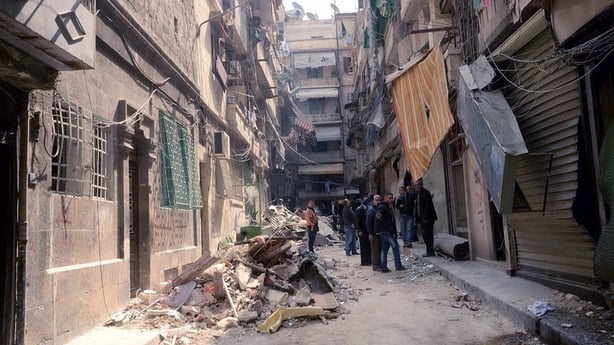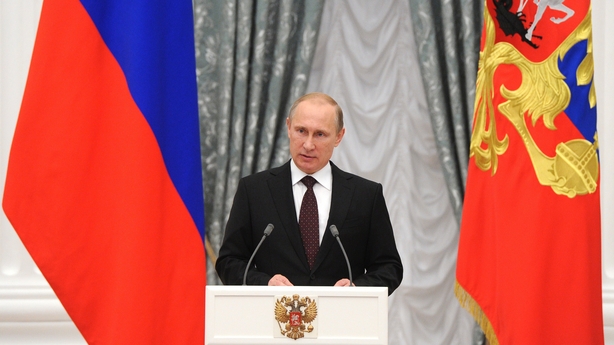The UN mediator trying to convene Syria peace talks has said it was urgent for Russia and the United States to reach an understanding to avert a military escalation that could effectively dismember the country.
The two powers are pivotal to ushering Syria's warring sides into talks, Staffan de Mistura said, though their differences seem so deep Moscow and Washington may not be able to establish a cohesive steering group of countries with peacemaking clout.
He said he would hold talks in Russia tomorrow and then in Washington. Mr De Mistura said intensifying fighting coinciding with Russia's military intervention in Syria made it more urgent to get Syrian government and opposition groups talking.
"What we must all avoid at all cost at this stage ... is a continuation of conflict... and a partition which de facto is already being seen as a possibility - and we consider that a tragedy," he told a news conference in Geneva.
"At the same time the situation could move into a toxic type of cocktail, a combination of a creeping Afghanistan with shades of Libya and Somalia. Hence the need for an urgent political process to start now."
Russia's entry into the civil war on Syrian President Basharal-Assad's side had "introduced new dynamics into the situation"and quickly displaced 40,000 civilians, Mistura said, and morecould flee if they feared intensified fighting.
"I am going to Washington immediately after Moscow – after all it makes sense since the two countries have been discussing, and need to discuss the future steps," he said.

Mr De Mistura said Assad's government had signalled its readiness to join four working groups that he planned to convene in Geneva to tackle aspects of post-conflict Syria. But the opposition Syrian Opposition Coalition has said it would not attend because of Russia's heavy air strikes on rebels.
The UN plan is for the talks to be supported by a contact group of interested countries that Mr de Mistura said would include the United States, Russia, Saudi Arabia, Iran, Turkey and other regional players.
"If some countries don't want to talk to each other, one could imagine separate contact groups that then are facilitated to discuss through the help of the U.N.," he said.
He urged Damascus to end its barrel-bombing campaign against rebels and said its forces and the Russian military must respect a stalled, regional U.N.-brokered ceasefire deal that would allow evacuations of civilians and wounded from the town of Zabadani and villages of Kufreya and al-Foua.
EU expected to condemn Russian strikes
European Union foreign ministers are expected to condemn Russia's air strikes on Western-backed rebels in Syria and warn they risk prolonging the conflict, according to a draft statement seen by Reuters.
"This military escalation risks prolonging the conflict, undermining a political process, aggravating the humanitarian situation and increasing radicalisation," read the draft prepared by EU ambassadors for the meeting of EU foreign ministers in Luxembourg.
Mr Putin has strongly defended his country's military operations in Syria.
Speaking in an interview with Russian state television, Mr Putin said the aim was to stabilise what he called the "legitimate authorities" in the country there and to create the conditions for a political compromise.
Mr Putin said that without Russian support for Mr Assad there was danger that what he described as "terrorists" would takeover Syria.

He urged western governments to share intelligence with Russia.
Russia has flown dozens of combat missions and launched more than 100 air strikes since starting the Syria campaign, according to figures from the Russian Defense Ministry.
Mr Putin said the goal of Russian air strikes was to pave way for a political compromise in Syria, which according to him is less possible when the Syrian army looks weak.
He said: "Our goal ... is to stabilise the lawful authorities and to create the condition for finding a political compromise.
"Yes, of course by military means. When units of international terrorists like Islamic State and others like them are next to the capital, there is no wish to negotiate with the Syrian authorities, who are almost besieged in their own capital.
"And vice verse in case the Syrian army shows its ability and readiness - which is most important - to fight terrorism, in case it shows that the authorities can do that, then the possibilities to reach political compromises will be much higher," he said.
He also said Russia's operation in Syria will be limited in time and would not involve any ground troops.
When asked if Russia would send soldiers to Syria, Mr Putin said it would not happen.
Meanwhile, several jihadists, possibly including French citizens, were killed in recent French air strikes in Syria against Islamic State, a French government source said today.
"The French air strikes in Syria killed jihadists," the source said. "There may have been French jihadists among them."
"There is talk of about six killed coming probably from a Syrian non-governmental organisation," the source added. "At this time we cannot confirm it," the source added.
France launched air strikes on 9 October in Syria against Islamic State training camps in an effort to prevent the group from carrying out attacks against French interests and to protect Syrian civilians.

